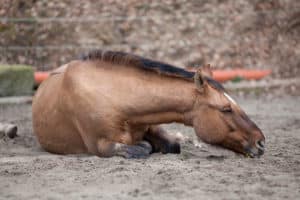2022 American Association of Equine Practitioners Convention Coverage
Read the latest in equine health research, news, and information presented at the 68th Annual AAEP convention in San Antonio, Texas
Each year The Horse’s team of staff and reporters attend the American Association of Equine Practitioners’ (AAEP) Convention, which is the world’s largest gathering devoted to horse health. This year equine veterinarians, researchers, students, and industry professionals attended the event, held Nov. 19-22, in San Antonio, Texas. The following articles include our in-depth AAEP convention lecture coverage from 2022. (Keep checking back as we update this page with content!)
Endocrine Disorders

Scientists Validate Stallside Insulin Test for Horses
Researchers compared the test’s results to those of a commonly used laboratory method to determine their association.

Pergolide Study Shows Long-Term Improvement in PPID Horses
A 13-year study showed this PPID treatment improves horses’ clinical signs and quality of life over prolonged periods.

Ertugliflozin Might Improve Insulin Issues and Laminitis in Horses
The Type 2 diabetes drug might help horses with chronic hyperinsulinemia and laminitis that haven’t responded to management changes.

Preventing and Managing Equine Metabolic Syndrome in Horses
How to recognize at-risk horses and manage them appropriately to prevent severe disease.

Researchers Evaluate Factors Affecting Oral Sugar Test Results
The horse’s fed vs. fasted state, dose and type of corn syrup, season, and simultaneous endocrine testing might alter the results of this insulin dysregulation testing method.

Not All Diets for Insulin-Dysregulated Horses Are the Same
Owners should take an individual and regional approach to planning low-NSC diets for ID horses.
Brought to you by:
Arthritis

Vets Examine New Alpha-2 Macroglobulin Joint Therapy for Horses
This stallside system might benefit horses with acute and chronic inflammatory synovitis.

Pentosan Polysulfate Safe, Effective for Arthritic Horses
A field study of the drug showed it significantly improved lameness in horses and induced no clinically relevant adverse effects.

How To Use PAAGs as Joint Therapy for Horses
When used properly, this injectable can be an effective substitute for traditional joint therapies for managing horses with osteoarthritis.

Questions and Considerations When Using PRP in Horses
One sport horse veterinarian describes how to choose a system and maximize its benefits in equine practice.

Practical Equine Joint Therapies for On-Farm Use
Conventional and easy-to-use joint therapies such as corticosteroids and hyaluronic acid continue to have their place in equine practice.

Using Stanozolol as a Joint Therapy in Horses
While prohibited in competition horses, this anabolic steroid might help vets manage joint disease such as osteochondrosis lesions in young horses.
Brought to you by:
Lameness

How Lameness Affects Horses’ Thoracolumbar Multifidus Muscles
Veterinarians might consider addressing axial skeleton adaptations when rehabbing horses with limb injuries.

Managing Proximal Suspensory Disease in Horses
A veterinarian describes the many ways to treat this complex yet common cause of lameness and poor performance.

No Link Between Laminitis and IA Corticosteroids in Healthy Horses
The overall incidence of laminitis due to IA corticosteroid injection might be lower than many believe.
Infectious Disease

Horses Are Susceptible to COVID Virus, but Not Disease
Researchers recently found healthy racehorses tested positive for SARS-CoV-2 following a COVID-19 outbreak among racetrack personnel.

Horses’ Muzzles Might Be Reliable Sites for EHV-1 Sampling
Researchers found the muzzle and outer nostril region present an alternative and less invasive way to test horses for EHV-1.
Performance Horse Health

Rein-Lameness Associated With TMJ Pain in Horses
Temporomandibular joint inflammation might be an overlooked cause of poor equine performance.

Can Improved Training Strategies Prevent Racehorse Injuries?
Managing the magnitude and frequency of limb loading is key to keeping horses—particularly racehorses—injury-free.

Scientists Validate Safety of Equine Blood Flow Restriction
Blood flow restriction (BFR), a human rehab modality, was found to be safe and well-tolerated by horses in a pilot study.

Pain Management in the Performance Horse
It is important for veterinarians and horse owners to understand the medication rules at high-level competitions when managing pain in equine athletes.
Diagnostic Imaging

Diagnostic Imaging and Treatment Options for Horses With Neck Pain
Veterinarians discuss how they radiograph, ultrasound, and treat neck problems.

Take Caution Using Contralateral Limbs for Patellar Ligament Exams
Comparing ligament striations in opposite limbs via ultrasound to determine if changes are normal versus tears could lead to misdiagnosis.

Ultrasound Underestimates Equine Neck Arthritis Swelling
While ultrasound is useful for identifying articular process joint effusion in horses, it might undervalue the amount of swelling present.

Evaluating the Suspensory Ligament in Cutting Horses
A research team used ultrasound to establish normal proximal suspensory ligament cross-sectional areas of cutting horses.
Equine Medicine

Right Dorsal Colitis in Horses: Similar to Cystic Fibrosis?
One researcher assessed the physiologic mechanisms of this type of colic and found they share similarities with cystic fibrosis in humans.

Do COX-2-Selective NSAIDs Affect Horses’ Response to Furosemide?
One researcher assessed the effects different NSAIDs have not only on horses’ response to furosemide but also their kidney function.

Colic Referral: The Tragedy of the Waiting Game
Timely decision-making could be the life-saving factor for colicking horses.

Researchers Unraveling the Mysteries of Recurrent Colic
Find out how veterinarians prevent and treat this painful condition.
Reproduction

An Immunomodulator Can Help Mares With Persistent Endometrial Cups
Injecting an immunostimulant directly into endometrial cups can cause them to regress, allowing broodmares that have aborted to come back into season.

Milking Mares and Maintaining Milk Production
Best practices whether milking a mare by hand, using a commercial device, or rigging a milker out of a syringe.

How To Improve Poor-Quality Cooled-Shipped Semen
Researchers assess ways to give stallions deemed “bad coolers” a fertility boost.

Do Mares Really Need Antibiotics for Bacterial Endometritis?
One veterinarian calls for cultures, cytology, and antibiotics when indicated.

Disorders of Sexual Development: Fairly Common in Horses
One theriogenologist describes equine reproductive development and how to diagnose horses with unexpected genitalia.

Biologic Therapies for Preventing Bacterial Endometritis
Research shows platelet-rich plasma and stem cell therapy can help treat post-breeding inflammation in mares.





